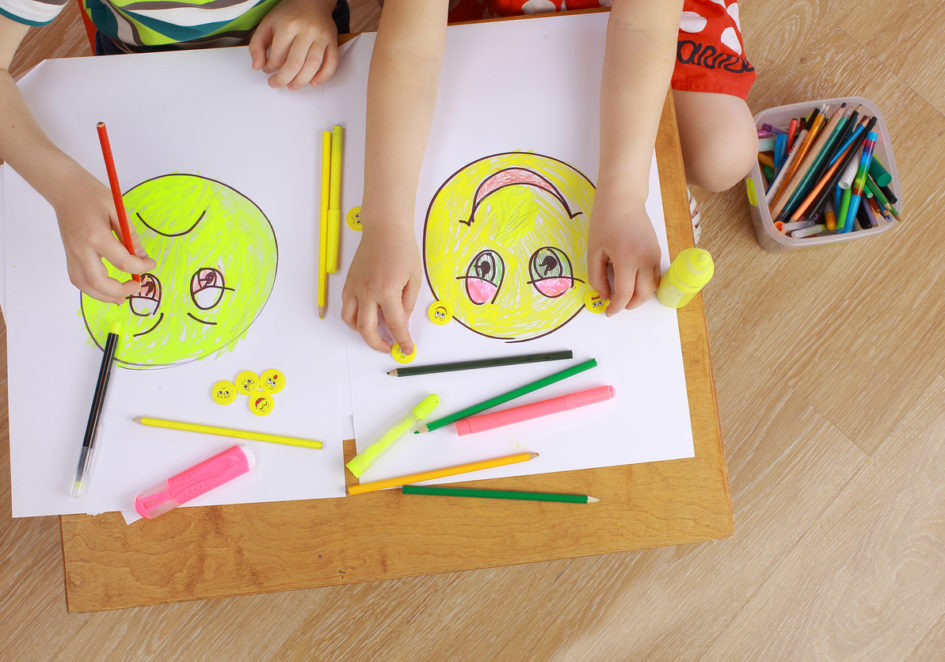
Blog
September 3, 2024
By Name Name
Social Emotional Development’s Vital Role in Kindergarten Readiness

“In fact, the skills that fall under the Social emotional Learning domain are made up of the skills children need to be a lifelong learner, a good community member, and someday, a successful adult who can collaborate, problem-solve and work through conflict with colleagues and peers in the world. Social emotional skills are, arguably, the most important skills a child will ever need.” – “Social Emotional Learning Pathways,” Washington Office of Superintendent of Public Instruction (OSPI)
For many parents, school readiness means teaching our kids to write their own name, sing the ABC’s and learn how to count. But recent surveys* show that teachers are prioritizing social emotional learning above academics when determining how ready children are for school. And it’s not just teachers. These skills will continue to be assessed when our kids go off to find jobs. Many hiring managers list skills like the ability to work in a team and communicate with colleagues and clients as top things they look for when finding a good fit for a job. All of these skills fall under social emotional learning.
Let’s start there. What exactly are these skills? Social-emotional development is a child’s ability to express their emotions effectively, follow rules and directions, form positive relationships with others, and build confidence. Many things affect social-emotional growth, such as a child’s biology, home environment, school environment, and life experiences.
To learn in a classroom, children must be able to manage their feelings, pay attention to directions, and play and work well with others. Children who learn how to do these things are more likely to:
- Establish friendships with other children their age
- Develop stronger speech and problem-solving skills
- Follow rules at home and at school
- Concentrate and work through a challenge
- Have confidence to try new things
Social emotional learning begins as soon as we are born, and parents can start tracking a child’s social emotional development as early as two months by thinking about things most babies can do at this age, such as:
- Calms down when spoken to or picked up
- Looks at your face
- Seems happy to see you when you walk up to them
- Smiles when you talk to or smile at them
“Often times parents start focusing on developmental milestones once they have concerns,” said Chris Gray, Senior Manager of Pregnancy and Early Childhood Development at WithinReach. “But tracking children’s development doesn’t have to be negative. It can be a celebration of what your child can do as well as a good way to look at what’s coming next.”
The Center for Disease Control offers a free, easy-to-use app that helps you track your child’s milestones with illustrated checklists, tips to encourage your child’s development and what to do if you have questions. You can find more information about the app on the CDC’s website.
Another way to look at your child’s development is through screening tools. Developmental screenings are activity-based questionnaires that ask you age-specific questions about your child’s development and activities that your child can do. Routine developmental screenings are good for all children between birth and age 6.
The Ages and Stages Questionnaire (ASQ) is a quick, easy and free developmental screening tool for your child—which only takes 10-15 minutes to fill out. The ASQ gives you an idea of your child’s current skills by looking into the five important areas of development:
- Communication: your child’s ability to understand language and express needs
- Gross Motor: your child’s ability to move larger muscles for sitting, crawling, walking, running or other activities
- Fine Motor: your child’s ability to move smaller muscles, like their fingers (grasping, object manipulation or drawing)
- Problem Solving: how your child plays with toys and solves problems
- Personal-Social: your child’s ability to relate to others and their self-help skills
Because of the importance of social-emotional health, there are also Ages & Stages Questionnaires®: Social-Emotional, Second Edition (ASQ®:SE-2), which provides a snapshot of children’s development in seven social-emotional areas:
- Self-Regulation
- Compliance
- Communication
- Adaptive Behaviors
- Autonomy
- Affect
- Interaction with People
Early identification of areas for growth in your child’s social-emotional development can make a huge difference in a child’s overall development. This is true as you look towards kindergarten, where educators will be looking at your child’s capacity and ability to learn with what they often call “The 4 Cs:”
- Critical Thinking
- Creativity
- Collaboration
- Communication
Help Me Grow Washington offers the ASQ, in both English and Spanish, for free to all families in Washington State! Families can complete the ASQ through a link on our website or by calling our hotline at 1-800-322-2588.
*Curby, T. W., & Berke, E. (2016, April). Kindergarten teacher perceptions of kindergarten readiness: The importance of social emotional skills. Paper presented at a roundtable of the American Educational Research Association, Washington, DC.


